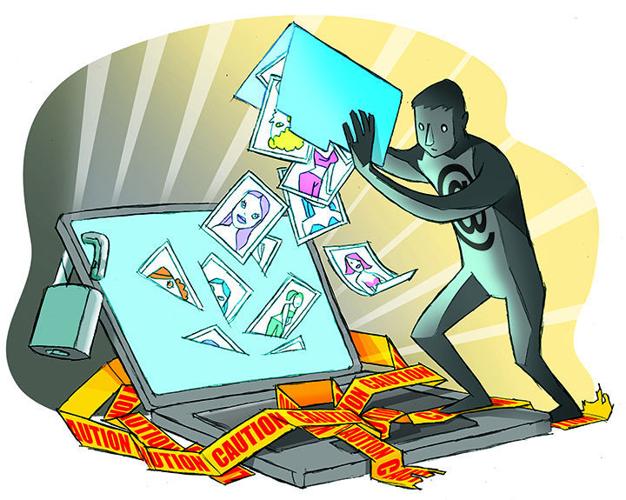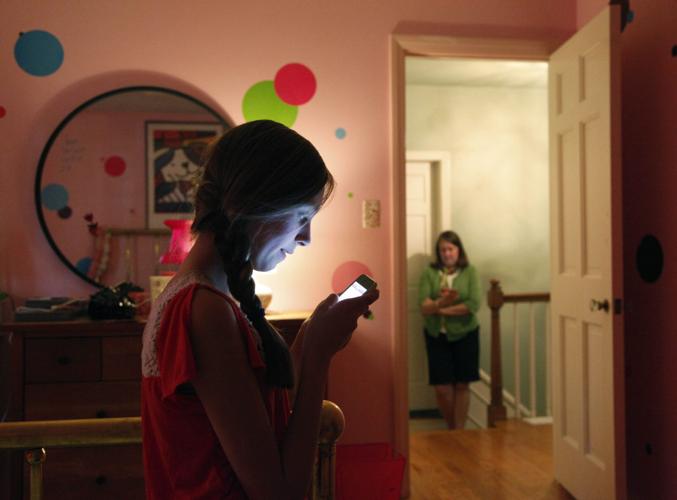Two experts in online privacy chatted about digital parenting to a nearly full auditorium at the Fox Tucson Theatre Wednesday night.
The discussion was the first part of a five week series hosted by the UA College of Social and Behavioral Sciences called Conversations on Privacy.
Guest speakers were:
Stephen Balkam, founder and CEO of the Family Online Safety Institute, which is an international nonprofit organization that strives to make the online world safer for kids and their families.
Amanda Lenhart is a senior research scientist at the AP-NORC Center for Public Affairs Research and serves as a researcher at the Data & Society Research Institute. She is currently leading a research project for the Digital Trust Foundation and previously spent 15 years studying the use of digital media and technology by teens, young adults, children and families at the Pew Research Center.
The conversation was moderated by Chris Segrin who is the chair of the UA Department of Communication and a behavioral scientist who studies interpersonal relationships and mental health.
Segrin asked the guest speakers for their viewpoints on various topics and asked them questions from concerned parents.
Here's a few points that stood out to us.
On how technology has changed
A lot of what's different is the ability to access information and people...We have the opportunity to create and share widely, Lenhart said.
Once things are shared, they are more persistent, she said. You can't just throw it away like you could a note. They are easily saved on a server.
Content is also editable, so we can't always trust what we're looking at.
"Things that look authentic are not always what they seem," Lenhart said.
The other difference is searchability. Things are more easily searched, now than ever, especially with facial recognition software.
All of this means that information is easier to find and surface than ever before.
On privacy
"It's the opportunity today to be able to control how your info gets shared and how people interact with you," Lenhart said.
Balkam looked to history to illustrate a point, saying that back in the medieval times, when people lived in villages, there was no privacy. Everybody knew everything about you.
"Privacy is a more modern notion, but I think if we look back at it...back into history, perhaps we're moving back into those medieval times," Balkam said. "Some tech leaders say privacy is dead. I don't think we're there yet. It's definitely eroded and has eroded more quickly in recent years. By the way, we're willingly doing this. Nobody is forcing us to post a Facebook update."
Americans have an uneven relationship with privacy, Lenhart adds.
"They care a lot about it but when you ask follow-up questions about what you did to protect it, Americans don't actually take that next step, so what happens is we say we're worried about privacy, but when we get the offer to get a discount but have to give them an email address to get that discount, we willingly give up that info to get the thing we want," Lenart said. "So there's a complexity in understanding."

On creating their online image
Kids and teens curate their online presence, showing different versions of themselves to different people.
"You choose what to share," Lenhart said. "You're presenting a particular version of yourself and it's to protect yourself from the people watching you and have power over you, like parents, employers or colleges."
"All of my daughters' friends have Facebook...That's what your parents and grandparents look at," Balkam added. "She also has Instagram and Tumblr and there are different versions of her on those different platforms and there are different permissions...Teens are acutely aware of their privacy and use it better than the parents."
Forty percent of young people think what they post online has to be what other people will approve of, so that means what you get is the perfect version, Lenhart said.
Parent question: In today's online environment is it safer for kids to have multiple online identities?
This can be challenging since some of the social platforms have to be linked to an actual name. That being said it's a logical step to take to protect themselves, Lenhart said.
On the flip side, though, kids and adults alike are more willing to say mean or hurtful things they normally wouldn't if it isn't attached to their real name.
"Having the opportunity to explore their identity on different online spaces is powerful," Lenhart said. "I think that's a useful and positive effect from technology."
When the kids are exploring these platforms, Balkam said to ask them three questions: Does it use a real name or is it anonymous? Is it gps tracking your child? Can you report to someone within the platform if something starts to go wrong?
"Younger teens should be very concerned if they're hanging out on gps-tracked apps," Balkam said. "There are a lot of pitfalls there."
On being a digital parent
Parents need to step up and talk to their kids at an early age. And they should be having conversations on a daily basis, Balkam said.
"There's gonna be a necessary loss of your child's privacy," Lenhart said. "It's important for parents to be engaged and as they get older, step back and let them explore more to learn how to be a fully fledged adult."
"Perfection is not going to be achieved," Balkam said. "This is a new road they are gonna have to get across...With millennials, I'm feeling more optimistic (than with boomers) because they've grown up with it but they're staring at their phones so much they don't look at their kids."
On parents over sharing
Since the internet is like a digital tattoo, meaning content never really goes away, parents might want to think twice about sharing that adorable photo of their little one on the potty for the first time. There are concerns of those images coming back to haunt them later in life.
"Nineteen percent of parents admitted they post stuff they proably shouldn't about their kids," Balkam said. "Does a child have any privacy rights?"
"Baby pictures are going to be something you can tie to an adult in facial recognition," Lenhart said. "As a parent these are things that are part of our lives...I think there is a challenge in finding the line in parents' ability to share something very important to them and that person's right to have a say in what's shared about them."
Is there such a thing as true online safety?
"Maybe we should be thinking of good enough security, good enough safety," Balkam said. "You're never 100 percent safe," Balkam said. "We know parents where the father has cloned his seventeen-year-old daughter's phone so every keystroke is on his phone...That's not healthy either."
"It's about balance," Lenhart said. "Good enough privacy is a great way of thinking about it, but we do have safety in numbers. We are one of millions of people online and the likelihood of our particular image being targeted is relatively low...If you have known concerns it makes a lot of sense to be very serious about privacy."
On parental monitoring
It's important to know your children when setting limits and monitoring them.
Are they impulsive and not great at assessing risk or are they level headed and trustworthy?
"If the child is just 13 and hasn't spent a lot of time online he needs some monitoring," Lenhart said. "If the child is 15 or 16 I'd say they need substantially less monitoring. I'm a big fan of the 'cool aunt'...another relative in the family who can serve as a porous membrane between the child and you but isn't you watching directly. I've heard many families lucky enough to have that arrangement."
What it boils down to for Lenhart is doing what works for your family.
"You can be a monitoring heavy parent. Go ahead and use technology to enforce the rules. If you're more interested in teachable moments, then talk through issues and don't monitor as much...Families have to find what's a good fit," Lenhart said. "Find ways to talk to your kids about what you think is important. It's important to talk about what's reasonable to share online, some of the risks you might encounter and how to mitigate them...Make sure you're the one conveying your values to them, not someone else."
Balkam said to set rules and be a good digital role model.
"Put your phone down at dinner. Don't take it to bed with you. Don't use it as an alarm clock," Balkam said. "Kids don't do what you ask them to do. They'll do what you do...Even if you don't understand the technology, don't forget to parent."

The decision to give a child a cellphone depends on the maturity of the child. Parents should model proper cellphone etiquette and safety.
7 steps to good digital parenting
- Talk with your kids: Stay calm, talk early and often, be open and direct
- Educate yourself: Search online for anything you don't understand, try out the apps, games and sites
- Use parental controls: Activate the safety settings in your operating system, search engine and games; use parental controls on your children's phones, tablets and game consoles and monitor your kids' use and their screen time
- Set ground rules and apply sanctions: Agree and sign a family safety contract, set time and place limits for their tech use, enforce sanctions when necessary
- Friend and follow but don't stalk: Friend your kids on social media, respect their online space and don't overdo it, encourage them to create a good digital reputation
- Explore, share and celebrate: Go online with the kids and explore, take advantage of new ways of communicating, learn from them and have fun
- Be a good digital role model: Curb your own bad digital habits, know when to unplug, show your kids how to collaborate and create online
Source: Family Online Safety Institute





